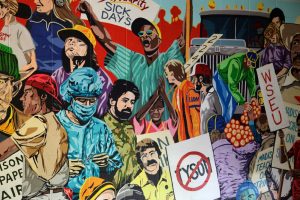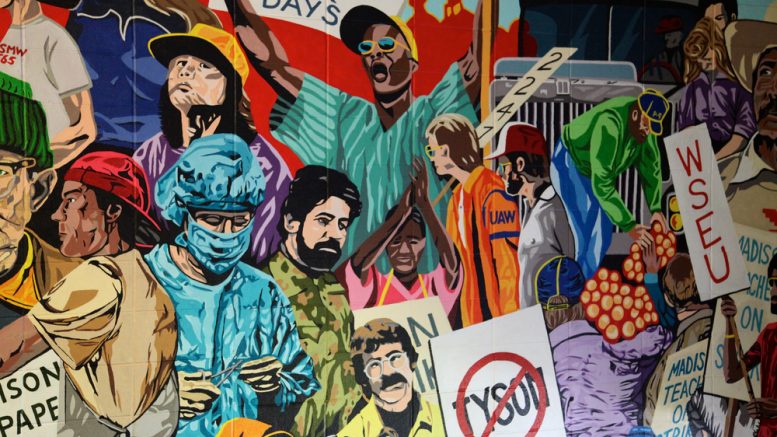
A different type of union. A different kind of life.
By Tom Crofton
The Commoner Call (6/12/17)
Many of the chronic problems we now see with the American union movement can be tracked back to the history of European craft guilds and the relationships of masters to apprentices. The constricting effect of one–to–one instruction, portioned out slowly over time to fit market demand and prevent competition between master and apprentice was one cause for the fractured condition of Labor today.
The transition to modern American trade unions followed the idea of organizing around skills instead of by entire industries, or even globally as kind of one great union proposed by the Wobblies (IWW).
Another kink in organizing workers is the contradictory American propaganda that individual freedom requires each person to struggle alone against the consolidated power of the owners, who use their influence and wealth to game the system against their fractured workforces. The conventional wisdom is that capital is required – and therefore capitalists are needed – to create our economy, but begs the question of whether a partnership with Labor is a precondition for success. Such thought also ignores a wide range of ‘flavors’ for that partnership, some of which thrive in other economies. American unions never think – much less talk – of taking control of the workplace, even though ultimately labor (both union and non-union) controls production in the workplace.
Trade unions in Germany define themselves as being more than a “collective bargaining machine”, but as important political player for social, economical and also environmental subjects, especially also for labor market policy and professional education.
Car wreck
A classic example of unions fighting for compensation but not taking part in deciding on production goals was seen in the post WW II American auto industry. Auto workers became some of the best compensated blue collar workers in history while cranking out absolute junk on the production lines. Their lack of concern about what they were building opened the door to imports of much higher quality vehicles whose gas mileage scored well when the energy crisis hit in the ‘70’s.
The blame for building gas guzzling rust buckets needs to be placed first on management and marketing, but also the unwillingness for those doing the actual labor to lobby for quality and be involved in the transition to a more sustainable economic model. The auto industry is the classic example of the artificial split in the American work psyche of doing the work but not being involved in the planning. We prosecute others for “only following orders” while we do the same when it is convenient.
A very different European union model of participation
Trade unions in Germany define themselves as not only a “collective bargaining machine”, but as an important political player for social, economic and also environmental subjects; especially also for labor market policy and professional education.
Employee representation in Germany has a binary structure: trade unions set the framework for working conditions, such as collective wage agreements, defining wage levels and working time on the one hand – and works councils (“Betriebsräte”) that are elected by employees and represent their interests on management level. They help shape and supervise the execution of the frameworks set by trade unions and laws in the company.
German industrial relations are characterized by a high degree of employee participation up to co-determination in companies’ boards (“Aufsichtsrat“), where trade unionists and works councils elected by employees have full voting rights. Local trade union representatives are democratically elected by union members. Central boards of directors (“Vorst and“) are elected by delegates.
German unions sit on corporate boards to help plan future production and ensure plans match the social goals of the country. The result is quite extraordinary by American standards. Germany has a very high level of alternative energy production and efficient public, hi-tech, and transportation systems. It has a very good public health care system that gets better results and costs half as much as ours. It has parallel systems of tech education and colleges to train workers for industry to a much higher degree than we do.
The French
The French have developed a mixture of socialist programs to blend with their capitalism. A 35-hour week, 5-week vacations, long-term maternity care, recuperation periods beyond medical care after injury on the job, and universal health care are just a few of the benefits workers can depend upon. Quite different than the need for many Americans to hold down several jobs, work 60-hour weeks, only to see their productivity gains passed along to stockholders while their wages stagnant and their skimpy benefits erode. In contrast, the French have developed a lifestyle that supports a more well-rounded, humane life.
The French conception of the trade union organization is that of the industrial trade union – as opposed to the occupational union – which unites all workers on both local and national levels, on the basis of the economic activity in which they take part, independently of the trade which they practice (for example: metallurgy, building, textiles, public services, and so on).
However, recognition has also been accorded to trade unions which bring together wage-earners practicing in the same trade but working in different sectors. This is the case, for instance, for administrative staff: bookkeepers, secretaries, and so on.
Compared with labor situations in other countries, the main feature of French trade unionism is its pluralism. Nevertheless, that has not prevented it from displaying a genuine effectiveness, which is apparent on comparing the social progress achieved in a range of different countries.
The American story
As we take a peek back to the post WWII era, the victors who helped the vanquished and conquered get back up on their feet now trail in the area of compensation and lifestyle. Basic to that loss is the lack of solidarity in the American psyche that can best be shown by the myth of the cowboy, or the settler family striking out to make it on their own (pushing of course the indigenous rabble out of the way).
American workers need to wake up, find some common purpose, and build that into the solidarity that our predecessors fought so hard to create.
The great pre-war New Deal effort to pick America up by its bootstraps has been reduced by the capitalists FDR saved to a shell of itself, and the twisted marketing to make that happen has gone into overdrive. Our unions have been complicit enablers. By not striving for partnership we have accepted our own de-evolution. Our willingness to support demagogues propped up by polluting, old-economy robber barons because they offer short term pipeline or mining jobs, leaves us powerless as they roll back clean energy goals and the new economy that is blooming elsewhere and creating whole new fields of long-term employment.
American workers need to wake up, find some common purpose, and build that into the solidarity that our predecessors fought so hard to create.
- The Trade Union Movement in the European Community: Published by the Trade Union Division of the Directorate-General for Information. European Communities (DG X Information) – 200 rue de la Lol. 1049 Brussels – Belgium.

